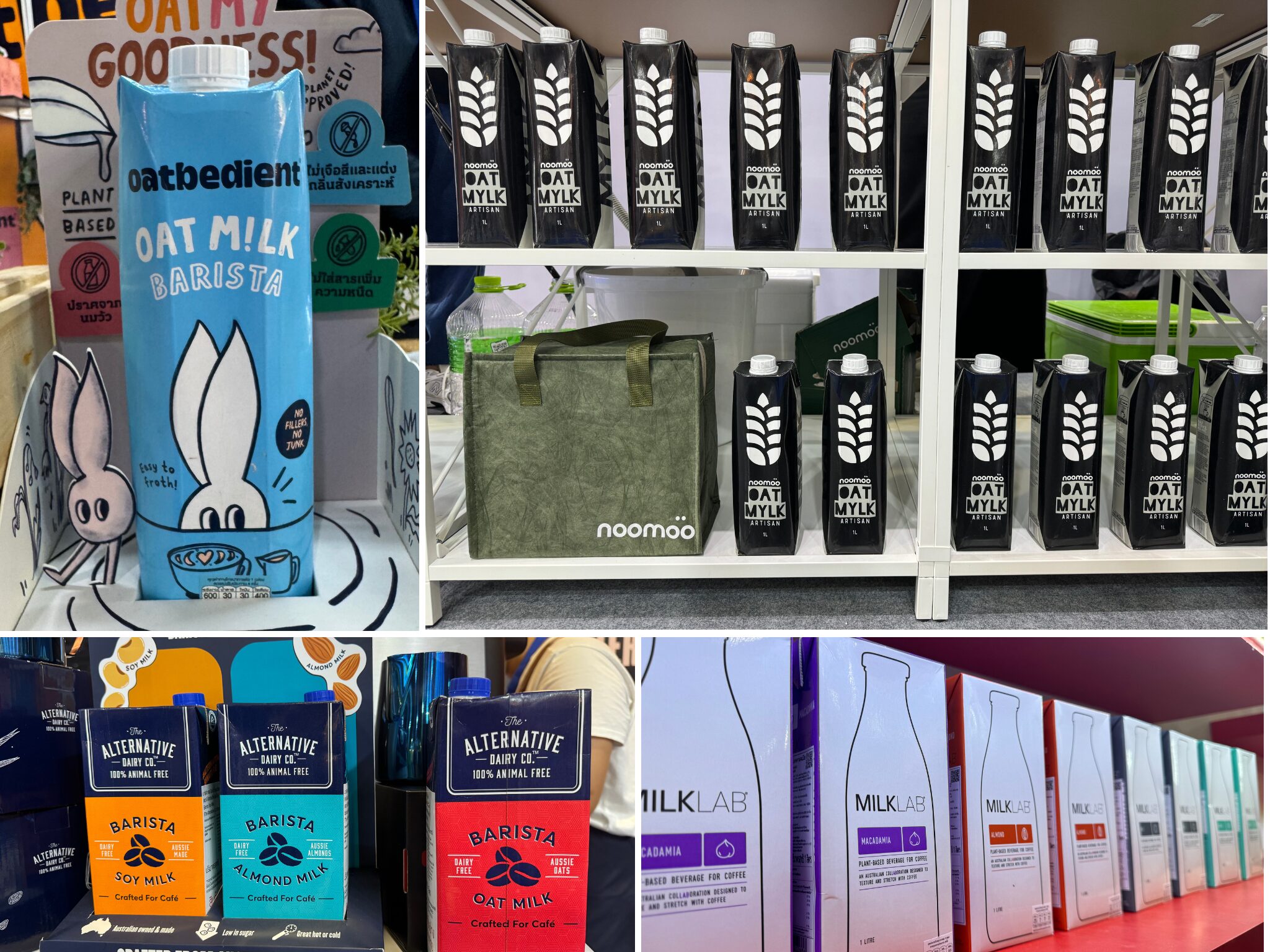THAIFEX-HOREC Asia 2024: Plant-Based Milk Steals the Vegan Show at Thailand Trade Fair
8 Mins Read
At the inaugural THAIFEX-HOREC Asia in Bangkok last month, representation for veganism was strong, particularly for plant-based milk, with a host of startups presenting new innovations in the space.
March brought with it scorching heat in Bangkok. 35°C really felt like 45°C, and it was on one of those days that I made my way to the Impact Arena in the Thai capital’s Muang Thong Thani development. And boy was I thankful, for there were exhibitors with vegan-friendly slushies, iced drinks and ice creams that as much quenched your thirst as they piqued your curiosity.
My eye was, of course, on all things plant-based. And in the giant hall, there were plenty of options that caught my eye. Not least from Thai J.Tip Food, which bedazzled me with a ham made from – wait for it – lotus root. It was unveiling its new vegan ready-meal brand Sun N Moon, which also happened to become the source of my lunch (a vegan massaman curry with quinoa).
But really, plant-based milk was the star of the show, with several different stalls dedicated to championing dairy alternatives in new and innovative ways, including powdered forms and barista milks specifically crafted for specialty coffee.
Oat milk powders evoke childhood nostalgia
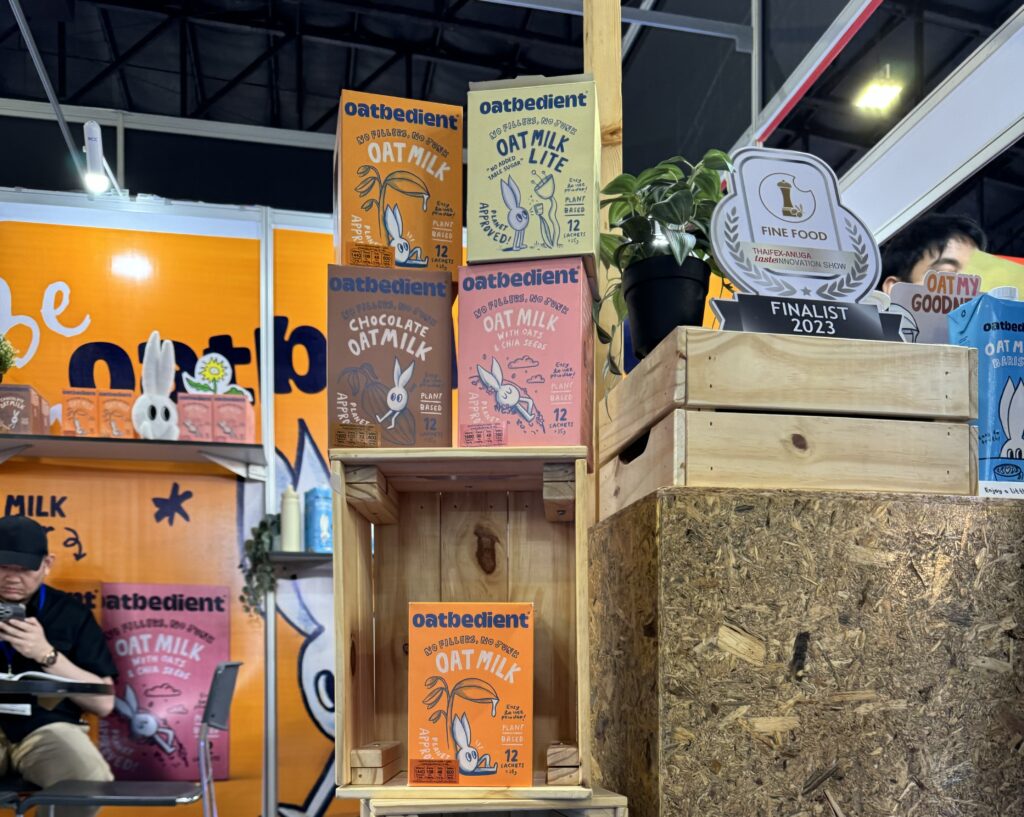
Plant-based milk already exists in several forms outside the traditional liquid version, including nut milk pastes, frozen concentrates and oat milk powders. But Singapore-based Oatbedient is focusing on something completely novel: a range of malted oat milk powders that you can drink straight up, a la Ovaltine.
Launched in 2022, Oatbedient offers four products: plain, chocolate, an oat and chia blend, and a sugar-free Lite version. All you do is add the specified amount of hot water to the mix, and voila! You’re living your childhood again.
“We felt there was a gap in the market, because most of the oat milks are all in liquid form, so we wanted to offer another alternative to give consumers some form of convenience,” Oatbedient co-founder and senior business development manager Alex Seh told me. “Some of the consumers we met say it tastes like Horlicks. That wasn’t an intentional thing – we just wanted to find the right ingredient that’s good enough for human consumption, but can bring up the taste to an optimal level, so you can enjoy a cup of delicious oat milk.”
Many plant-based foods can be processed, which has become a turnoff for many consumers. But while there’s definitely a health play here, taste remains king. “The product itself has no palm oil, less sugar, non-GMO, etc. But at the same time, it has to taste delicious. Because what’s the point if we give you all the health benefits, but sacrifice the taste?” he noted. After taste, he believed price is the leading consumption driver for plant-based food in Asia. Sustainability continues to be increasingly important too.
“We have forecast the rise of waterless plant milks some time back, making products more eco-friendly, reducing packaging waste and cutting down on CO2 production and shipping emissions,” said Rachel Tan, food and drink strategist at WGSN. “Opportunities around frozen, shelf-stable and refrigerated are huge, alongside different formats including pastes and concentrates.”
She added: “These new formats will not only appeal to climatarians who value sustainability, but also a larger cost- and convenience-conscious consumer base when you think about longer shelf-lives, portability, customisability and food waste reduction.”
Clean-label and barista milks take the cake
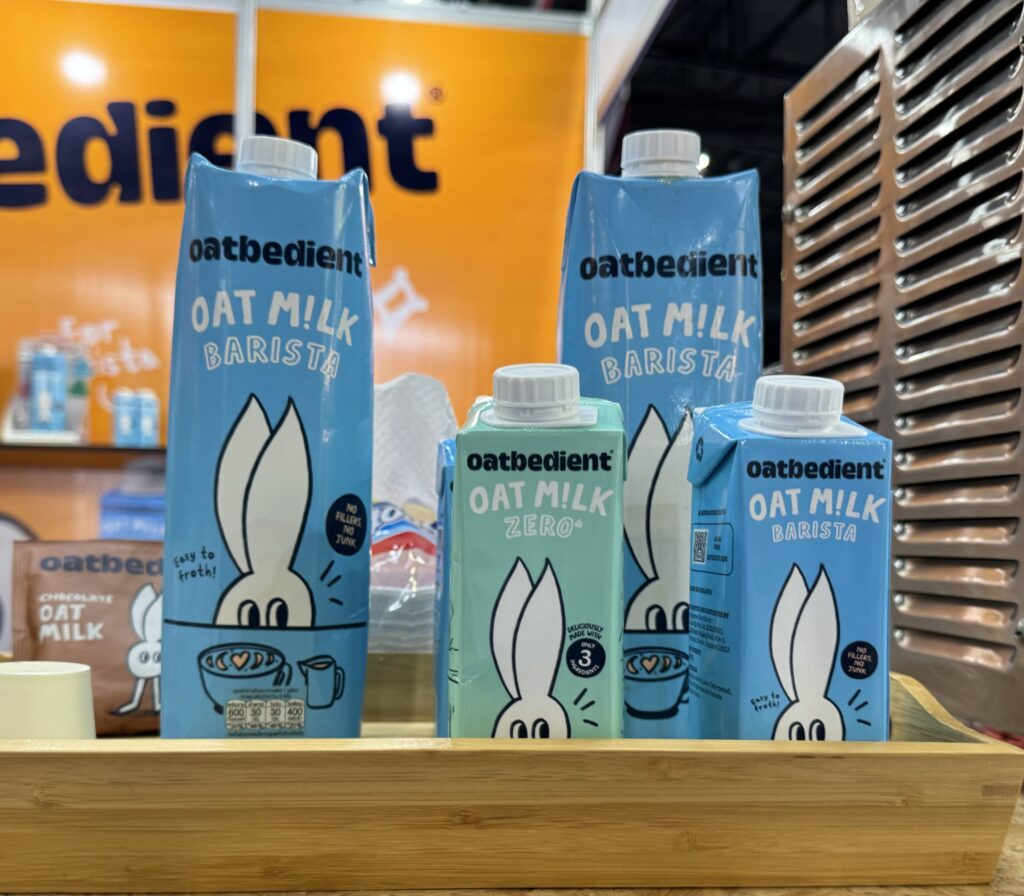
For all the talk about convenience, it wasn’t just the malted oat milk powders Oatbedient was showcasing at THAIFEX-HOREC Asia. The company has just entered the liquid space with barista and Zero oat milk varieties. “To be a full-fledged plant-based milk player, I think inevitably, you need to offer what is already out there in the market,” Seh explained.
He alluded to how consumers want more clean-label products. “The Zero milk is the cleanest oat milk you can find on the market, because it’s just three ingredients: oats, water and Himalayan salt. That’s it,” he said. “The very positive feedback we’ve gotten is: ‘It’s amazing you guys have this alternative. I like oat milk but I don’t like the oil.'”
“Health-minded consumers are becoming increasingly concerned with how products are made, with plant-based options particularly under scrutiny,” explained Tan. “A recent slump in the sales of plant-based products in the US was partly attributed to a desire for more ‘clean labels’. Pioneer brands are prioritising natural ingredients and scrapping alienating processing methods to increase transparency, enhance health credentials and build consumer trust.”
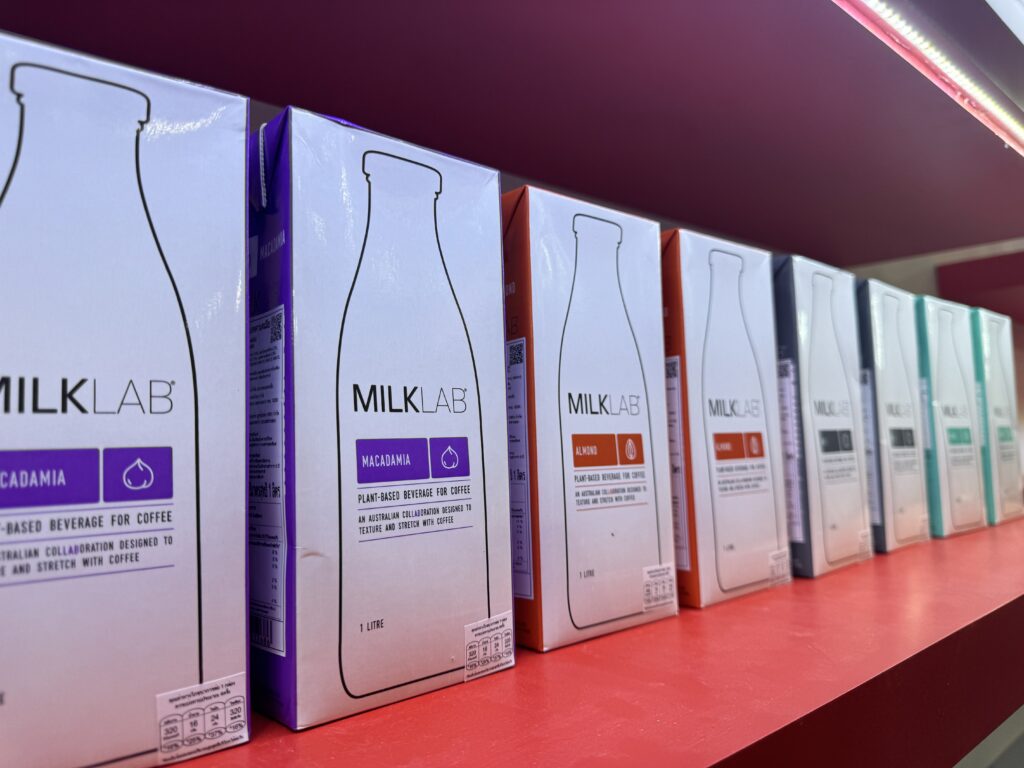
As for barista milks, there was Australian representation in this space from the likes of Milklab and The Alternative Dairy Co. Both exclusively work on milks for coffee, with the former having just launched in Thailand. With a portfolio of oat, soy, coconut, almond and macadamia milks (alongside a UHT dairy option too), Milklab is in 29 countries, and has accounts with industry giants like Starbucks in India, Malaysia, Singapore and Australia, and McDonald’s in Australia.
A brand representative for Milklab told me that while soy milk remains the most popular alt-milk in Thailand, oat is now the leading consumption driver of plant-based dairy – playing to the country’s affinity for coffee mocktails, its stall was all about highlighting its milks in iced beverages.
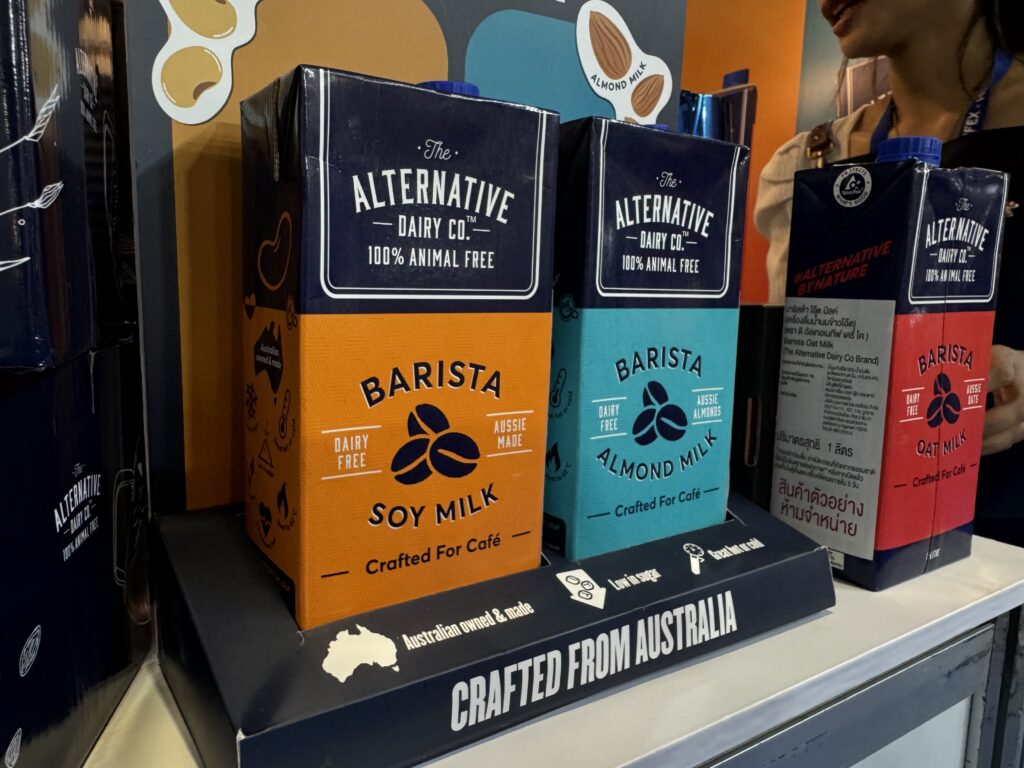
The Alternative Dairy Co., meanwhile, is owned by Sanitarium, the parent company of So Good. But this is geared exclusively towards foodservice, with So Good spearheading the business’s retail market in Autralia. It makes oat, soy, coconut and almond milk – the latter is the most neutral-tasting almond milk I’ve ever tasted. A company spokesperson told me that Australia’s alt-milk culture is similar to the US’s, in that almond milk has always reigned supreme, but oat is catching up, and is the future of the sector.
Interestingly, she added that plant-based milks now make up about a third of the market in Australia’s coffee industry, and in areas like Melbourne and Bondi Beach, they make up over half of the total. This means that in certain areas, it’s dairy that’s the alternative. How about that?
Oat milk goes in on the granular
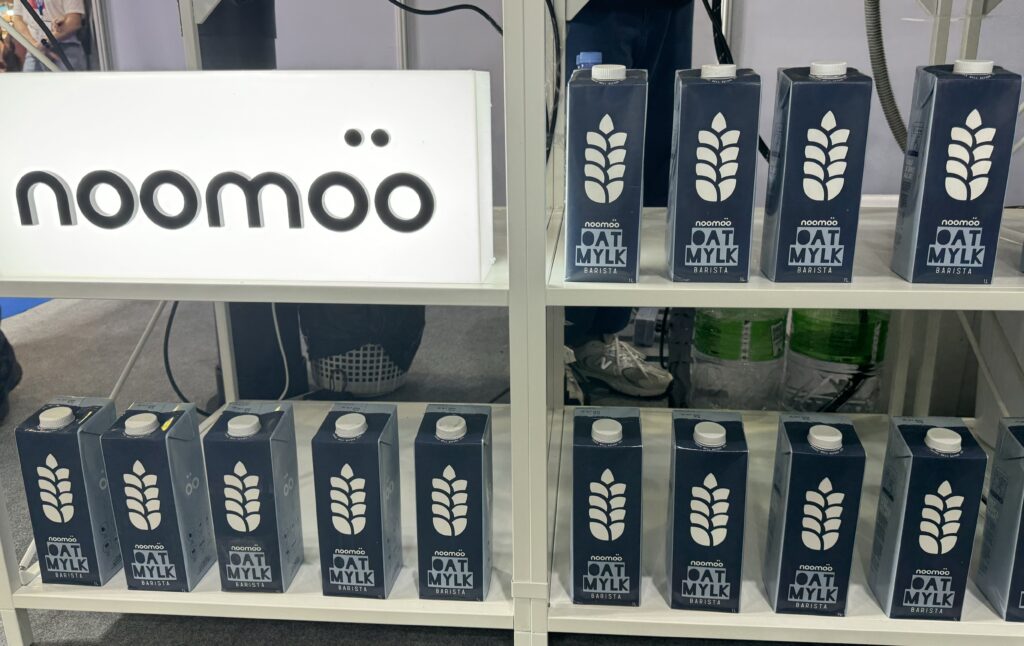
The barista milk party didn’t end there. The most intriguing player at THAIFEX-HOREC Asia was Singapore’s Noomoo, which was launched last year and is working on a full range of plant-based milks. While almond and soy are slated for the future, the current lineup – which is in over 250 cafés in Singapore and Malaysia – comprises coconut and two oat milks. You read that right.
The coconut milk, which is combined with pea protein, is the freshest-tasting coconut milk I’ve had, and might just be one of my favourite plant-based milks overall, given it works as a standalone, in teas like hojicha and genmaicha, and in coffee too.
As for the dual barista oat milk range, the idea is to create products that have specific functions for different kinds of coffee. The milk titled ‘Barista’ is crafted from Australian oats and high-oleic canola oil, and geared towards medium to dark roasts. “The Australia one is created for when the cups are bigger. In some countries, they like ice and a lot of milk, so it needs to be a bit lighter and goes with darker roasts, which are chocolatey and nutty. This will help to round it and balance it,” co-founder and chief action officer Nick Chan told me.
He explained that the milk’s formulation isn’t heavy enough to mask the acidity of very light-roasted coffees: “If you’re a coffee connoisseur, you might not like or appreciate the acidity of coffee.” If you are one, though, the Artisan oat milk is for you.
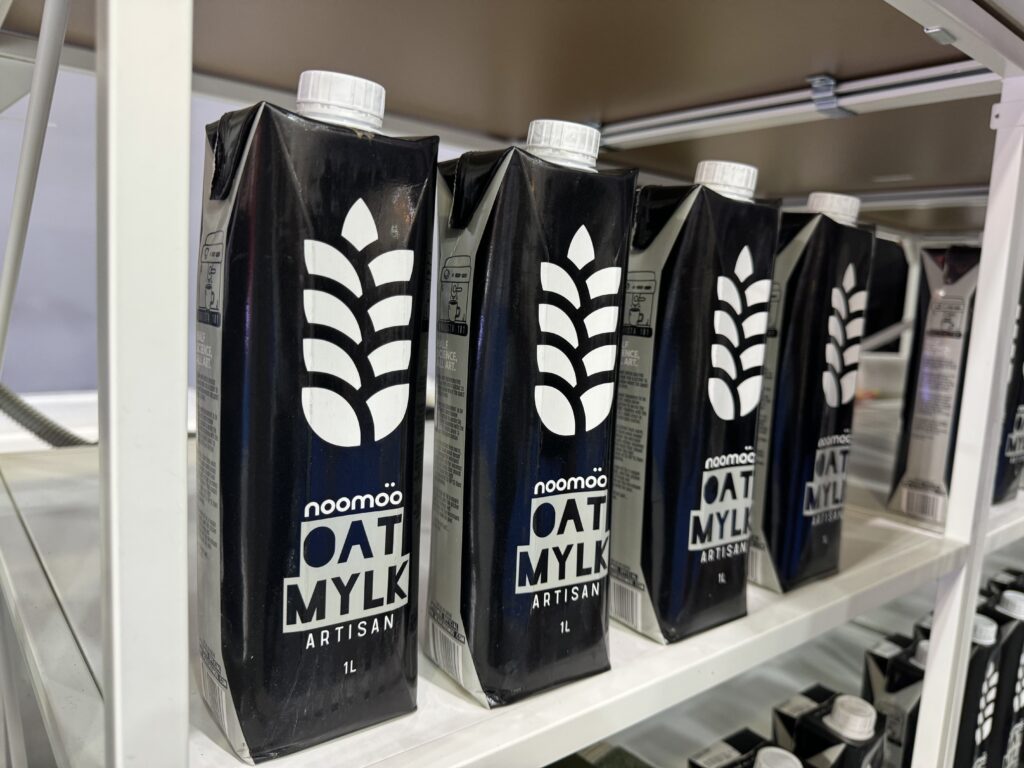
Based on Mongolian oats, which he said are naturally higher in protein and enhance the frothability of the milk, this one is a bit heavier on the oats (11%, versus 10% for the Barista blend) and contains low-sodium lake salt, creating a creamy element without interfering too much with the flavour. Adding more oats to make the coffee shine more might feel counterintuitive, but it works.
Chan explained that given its neutrality and creaminess, oat milk complements coffee better than other milks, and is fast capturing Asia’s plant-based milk market. “If you just go to oat milk for two weeks, you cannot go back to milk,” he suggested.
“This trend towards barista milk is in line with the rise of fourth-wave coffee which democratises quality, encompasses sustainability and bottom-up creativity. Coffee consumers are becoming more sophisticated, seeking greater sensory engagement, and wanting to participate in the home café trend,” noted Tan. “This will have legs beyond food service to new RTD styles and at-home consumption. Complementary categories like dairy, nut milk, syrups and condiments can create products that elevate drinking rituals at home – including speciality barista milk.”
Noomoo will be looking to take market share from Asia’s oat milk market leader, Oatside. Oatly, which will also release a light-roast-friendly barista milk this year, is the other major player in the region. Noomoo is already in over 250 cafes in Singapore and Malaysia. Now, it’s launching in Thailand, and aims to target Indonesia and South Korea next. “At the moment, I’m trying to get professional endorsements for the products, which is why I’m working with baristas,” he said.
As a former barista, I can safely say the endorsement would be universal.

